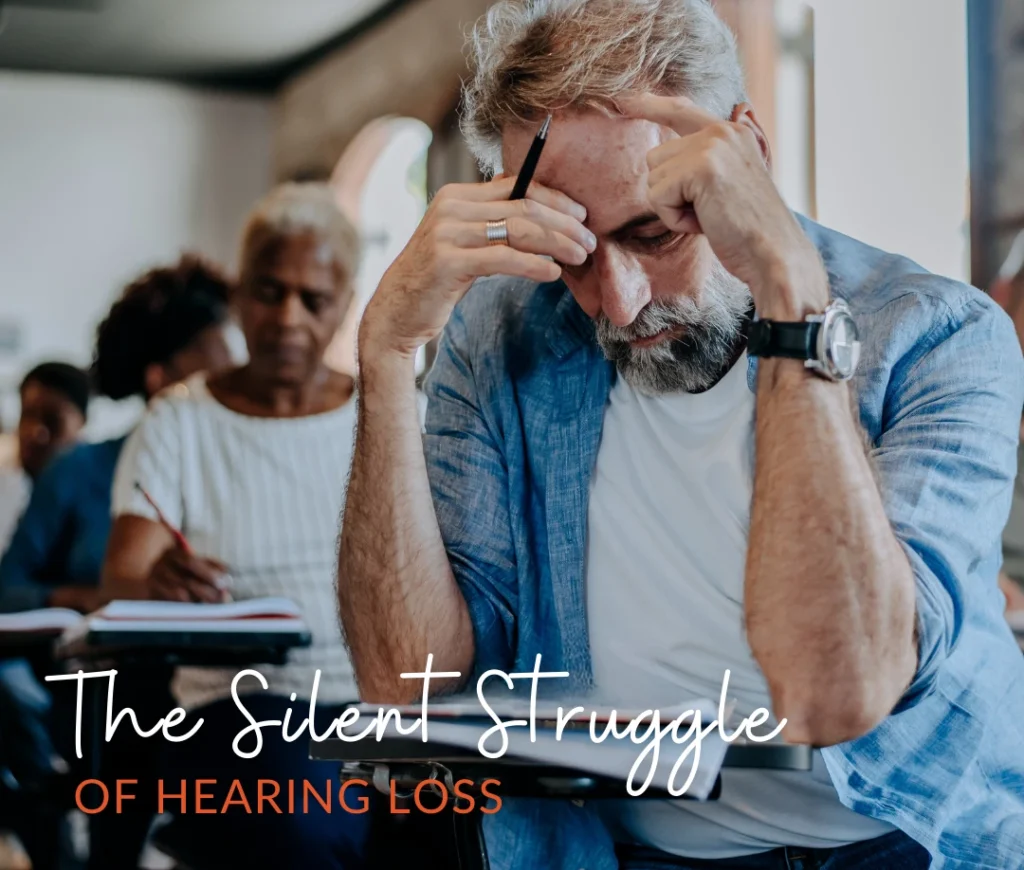The Silent Struggle: Why 60% of Australians with hearing loss aren’t seeking help

Hearing loss affects approximately one in six Australian adults1, yet an alarming 60% of those experiencing it never seek assistance. This silent epidemic has far-reaching implications, from strained relationships to diminished mental health. Despite modern hearing solutions and accessible services, many remain hesitant to take the first step toward better hearing. Why is this the case?
In this blog, we’ll delve into the barriers – both practical and psychological – that prevent people from seeking help, the profound effects untreated hearing loss can have, and how to break the cycle of inaction.
Hearing loss in Australia: The big picture
Hearing loss is one of the most common chronic health issues in Australia. The prevalence increases with age, affecting nearly 70% of those over 702. However, it’s not just an issue for older adults. Noise exposure, ear infections, and genetic factors contribute to hearing issues across all age groups.
Despite the high numbers, only 40% of Australians with hearing loss actively seek help. This means millions are struggling in silence, often unaware of the profound impact this has on their quality of life.
Why do people delay seeking help?
Understanding why so many Australians delay addressing hearing loss is key to overcoming this issue. The barriers fall into two main categories:
Practical obstacles
- Cost: Hearing aids, consultations, and follow-ups can be expensive, even with government subsidies and private health insurance. Many people perceive hearing solutions as unaffordable luxuries rather than essential health tools.
- Accessibility: In rural or remote areas, access to audiologists and specialised care can be limited. Long travel times and limited appointment availability deter people from seeking help.
- Time: Busy lifestyles often lead individuals to deprioritise their hearing health.
Psychological barriers
- Stigma: Despite advancements in hearing aid technology, outdated perceptions persist. Many associate hearing aids with aging or disability, leading to embarrassment or fear of judgment.
- Denial: Some individuals downplay their hearing loss, convincing themselves it’s not severe enough to warrant attention.
- Lack of awareness: Many people are unaware of the symptoms or the solutions available, delaying intervention until the problem becomes unmanageable.
The ripple effects of untreated hearing loss
Hearing loss is not just a physical issue; its effects extend into emotional, social, and economic realms:
Mental health impacts
Hearing loss has been linked to depression, anxiety, and even cognitive decline. The struggle to understand conversations can lead to frustration and feelings of isolation, eroding self-esteem over time.
Strained relationships
Miscommunications caused by hearing loss can put significant strain on personal relationships. Loved ones may feel ignored, while those with hearing loss may withdraw to avoid the embarrassment of misunderstanding.
Workplace challenges
In the workplace, untreated hearing loss can reduce productivity and career progression. Missing critical details in meetings or struggling with phone calls can create stress and even job insecurity.
Economic costs
On a societal level, untreated hearing loss is costly. A recent study estimated that the economic burden of untreated hearing loss in Australia is an estimated $15.9 billion3, including lost productivity, healthcare costs, and reduced quality of life.
Breaking down the stigma
The stigma surrounding hearing aids is a significant barrier to seeking help, but perceptions are changing. Modern hearing aids are sleek, discreet, and technologically advanced. Many are barely noticeable and come with features like Bluetooth connectivity and noise-cancelling capabilities.
Education plays a vital role in breaking the stigma. Public awareness campaigns and open conversations can help normalise the use of hearing aids, much like glasses or other assistive devices.
Support services and solutions
The good news is that help is readily available. In Australia, the government and private organisations offer support services, including:
- The Australian Government Hearing Services Program: Provides fully or partially subsidised hearing assessments and devices for eligible individuals, such as pensioners and veterans.
- NDIS support: Individuals with significant and permanent hearing loss may be eligible for subsided devices or rebates.
- Community support: Some local charities or organisations offer education, resources, and outreach programs.
Advances in hearing aid technology have also revolutionised care. Solutions like rechargeable hearing aids, waterproof devices, and AI-powered noise reduction make hearing aids more appealing and functional than ever.
Stories of transformation
Personal stories can be powerful motivators for change. Take Sarah, a 45-year-old teacher who struggled with undiagnosed hearing loss for years. She avoided social gatherings and felt increasingly disconnected from her students. After finally consulting an audiologist, she was fitted with hearing aids that restored her confidence and reignited her passion for teaching.
Or consider Graham, a retiree who resisted hearing aids for fear of looking “old.” After his wife encouraged him to try them, he rediscovered the joy of family conversations and even joined a local choir.
These stories remind us that taking the first step can lead to a dramatically improved quality of life.
Taking action on hearing loss
Hearing loss is more than a personal inconvenience – it’s a public health issue with wide-ranging effects. Overcoming the barriers to seeking help requires a combination of education, accessible services, and societal shifts in perception.
If you or someone you know is experiencing hearing difficulties, don’t wait. The sooner hearing loss is addressed, the better the outcomes. Reach out to an audiologist, explore modern hearing solutions, and take the first step toward reconnecting with the world around you.
Hearing is precious. Let’s not let stigma, cost, or denial keep us from embracing it fully.
At Knox Audiology, we take pride in our team of university-qualified and experienced audiologists, who are committed to providing trusted, friendly, and professional hearing services, catering to all your unique hearing needs. Whether you’re looking to upgrade your current hearing aids or optimise Bluetooth functionality, our experts are here to guide you through the process. Our comprehensive and diagnostic hearing tests are designed to understand and address your specific concerns, ensuring the best possible outcomes. For any support, please reach out to us 03 9800 5697 or book online.
1 https://www.betterhealth.vic.gov.au/health/conditionsandtreatments/hearing-loss-how-it-affects-people
2 https://www.health.gov.au/hearing-health/about
3 https://hcia.com.au/2023/08/over-1-3-million-australians-are-living-with-hearing-loss-that-could-have-been-prevented-new-report-finds/
